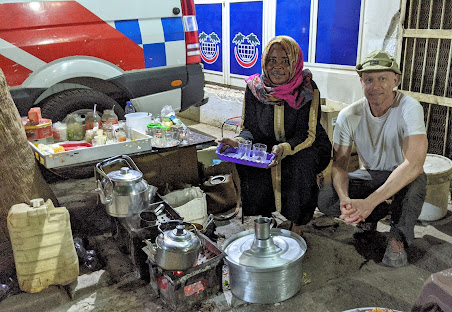I've written previously about Sudan: before civil war erupted, its promising economic prosperity and a friend's nascent tourism business. At last check, that friend at least was safe with family away from Khartoum.
The location of the GNP Tower makes its loss all the more troubling. The tower sits on a small peninsula, jutting out into the confluence of the Blue Nile and White Nile Rivers. The peninsula is the site of office buildings for oil companies, banks, and the government's Ministry of Investment. Those aren't military targets. The area, which I walked through in 2020 (right: my photo from the water, at the river confluence, CC BY-NC-SA 4.0), had been under the control of the Sudanese Armed Forces (SAF, which is fighting the Rapid Support Forces, RSF).Watch: Sudan’s iconic Greater Nile Petroleum tower in Khartoum is engulfed in flames as the war between rival forces enters sixth month. It is yet unclear what caused the fire through the tower.#Sudan #Khartoum
— Al Arabiya English (@AlArabiya_Eng) September 18, 2023
Read more: https://t.co/Kmbnzv4YI8 pic.twitter.com/iAt8x62fez
The two sides blame each other for starting the tower fire. Either way, extension of the destruction into this finance zone is yet another sign that little of Khartoum's civilian infrastructure will survive the war. Observers have said that the city will not be fit to remain the capital when the conflict ends. The SAF already has indicated its intention to relocate the government to Port Sudan, on the Red Sea. Accordingly, and alarmingly, the war is reaching out to both ends of the country.
Meanwhile, in North Africa, Libya and Morocco continue to cope with the devastation of natural disasters.
I've not been to Libya; ABC's Ian Pannell is there now. I have seen Morocco's scenic Ourika River valley, which is in the earthquake zone (N.Y. Times). Homes perched on hillsides and single-path footbridges suspended across the river ordinarily are what makes the area picturesque. But those conditions are not primed for earthquake resistance.
Here are some photos from the Ourika River valley in better times (all 2016, RJ Peltz-Steele CC BY-NC-SA 4.0; latter, me with travel mates from Mauritius).
My prayers are for all of the people suffering in these disaster zones.






